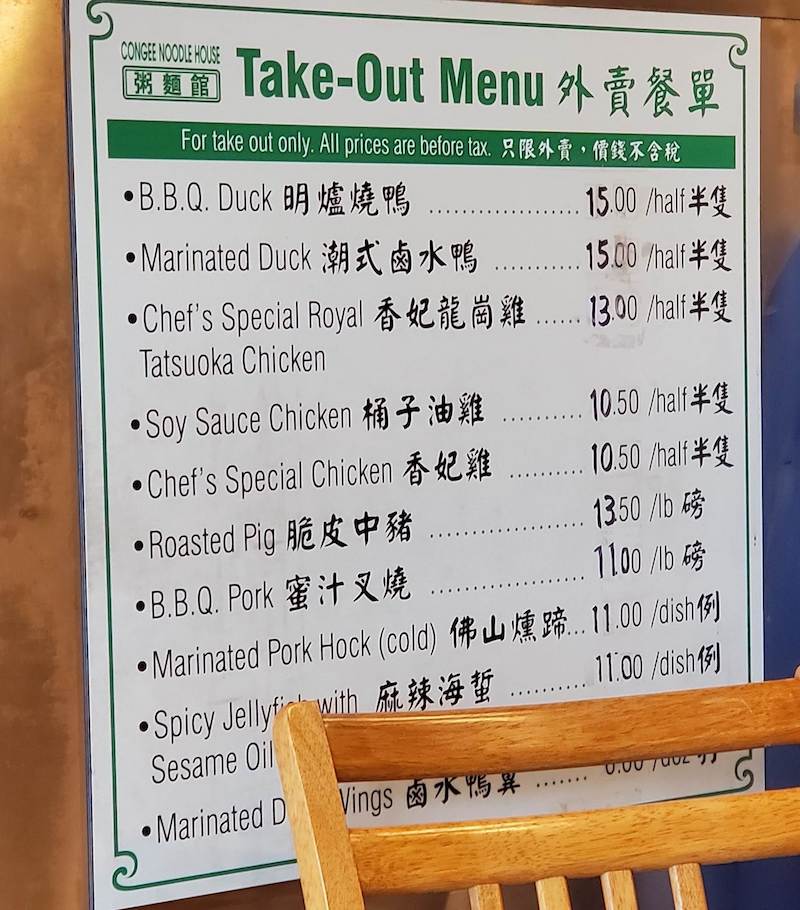Menu overtranslation
« previous post | next post »
Bruce Rusk sent in this photograph taken at his local (Vancouver) Hong Kong-style congee joint: the English translation of the third item on the menu reads the Sinographs 龍崗 (lit., "dragon hillock / mound / [lookout] post / sentinel / sentry") as a Japanese toponym or family name, when they should be read in Cantonese (as the name of a neighborhood in Shenzhen, he believes).
Note that the Chinese name of the fifth item on the menu is the same as that of the third item, sans the troublesome 龍崗. Yet the fifth item comes out in English as just "Chef's Special Chicken", whereas the third item is rendered as "Chef's Special Royal XX Chicken".
In either case, whether "Chef's Special" or "Chef's Special Royal", that's how they choose to render in English what the Chinese has as C. hoeng1fei1 / M. xiāngfēi 香妃, which literally means "Fragrant [Imperial] Concubine". This is a reference to the "Fragrant Concubine" (Chinese: 香妃; pinyin: Xiāng Fēi; Uyghur: ئىپارخان / Iparxan), the Uyghur consort of the Qianlong Emperor of the Qing dynasty in the 18th century.
Here (Baidu) and elsewhere C. hoeng1fei1 gai1 / M. xiāngfēi jī 香妃雞 is more prosaically called "steamed chicken with salted sauce".
Readings
- "Congee: the Dravidian roots of the name for a Chinese dish" (11/13/17)
- "Chinese restaurant shorthand, part 2 " (11/30/16)

unekdoud said,
December 19, 2019 @ 3:41 am
I can't resist the urge to point out that 江南 is one of those common toponyms that could be romanized differently depending on which country it comes from.
Also interesting for me is the variety of "Marinated" items on the menu using different Chinese characters. Obviously they are very different tastes lost in translation.
Cynthiva said,
December 20, 2019 @ 4:30 am
I think it is incorrect to directly translate the names of the dishes. Not only will people misunderstand the method of making dishes, but also misunderstand diet culture in different regions. For example, the first item B.B.Q Duck 明爐燒鴨and the seventh item B.B.Q Pork蜜汁叉燒. Both dishes are translated using BBQ, which is incorrect. BBQ is usually done outdoors. When people go out, they usually place charcoal on the barbecue table, then ignite the charcoal with fire, and place the barbecue grill made of metal on the charcoal. Spread some sauces such as soy sauce and chili noodles to cook food with smoke. 明爐燒鴨 is made from duck as raw material, white sugar, spring onion, salt, etc. as the seasoning. It should be translated into Roast Duck. 蜜汁叉燒is marinated lean pork on a special fork and placed in the oven to be cooked on the fire. It should be translated into Honey-Stewed Char Siu.
Tess said,
December 20, 2019 @ 8:31 am
This is the charm of learning a language, not only through the direct translation of the mother tongue to learn, some aspects, such as dishes, but also requires us to understand the relevant cultural knowledge of the country.
Tess said,
December 22, 2019 @ 2:22 am
In my opinion, such language phenomenon is very common and interesting. However, there are some errors in translation. As the author says, “Royal Tatsuoka” means that “dragon hillock” , it is just a place name. Perhaps the dish is so famous in dragon hillock that it has the place name in its name specially. In the same way, “Fragrant Concubine” is just a woman’s name. All in all, they are only allusions or legends. Neither the ingredients of the dishes nor the way they are cooked have a direct connection with them. It is only because of Chinese habits that they are used today.
This is the charm of learning a language, not only through the direct translation of the mother tongue to learn, some aspects, such as dishes, but also requires us to understand the relevant cultural knowledge of the country. It is advisable for learners to broaden knowledge horizon and improve learning ability. Besides, some of the names of roads or places of interest are also quite meaningful. Welcome to explore together!